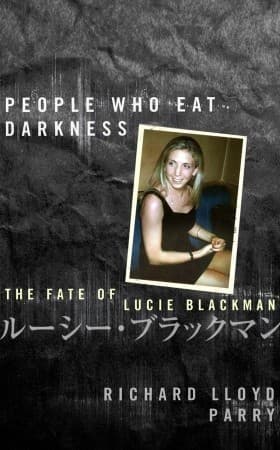
Book Review Summary: People Who Eat Darkness: The Fate of Lucie Blackman
Introduction
"People Who Eat Darkness: The Fate of Lucie Blackman" is a gripping and incisive account of the case of Lucie Blackman, a young British woman who disappeared in Tokyo in 2000. The book, written by Richard Lloyd Parry, provides a comprehensive and detailed exploration of the events surrounding Lucie's disappearance, the subsequent investigation, and the trial of the man accused of her murder. Parry's extensive research and interviews with those involved in the case bring to light the complexities of Japanese culture, society, and justice system. This book is a must-read for anyone interested in true crime stories, Japan, or the human psyche.
About Richard Lloyd Parry
Richard Lloyd Parry, the author of "People Who Eat Darkness," is an award-winning foreign correspondent and Asia Editor of The Times newspaper of London. With over two decades of experience covering international news, Parry brings a unique perspective to the story of Lucie Blackman. His extensive knowledge of Japan and its culture adds depth and context to the narrative, making it a compelling read for both seasoned journalists and general readers.
Analysis of Views
-
The Complexity of Japanese Culture: Many readers praised Parry's exploration of Japanese culture and society. They appreciated his insight into the unique customs, traditions, and social norms that influenced the investigation and trial of Lucie Blackman's case. The book provides a fascinating glimpse into the Japanese justice system and highlights the differences between Japanese and Western legal approaches.
-
A Well-Researched and Engaging Account: Readers found "People Who Eat Darkness" to be a well-researched and engaging account of the case. Parry's writing style kept them hooked from start to finish, as he skillfully weaves together the various threads of the story. The book is not just a retelling of events but also an exploration of human nature, societal pressures, and the impact of tragedy on individuals and families.
-
The Depiction of Lucie Blackman: Several readers commended Parry's portrayal of Lucie Blackman as a complex and multi-dimensional character. They appreciated the author's efforts to humanize Lucie beyond her role as a victim and to convey her struggles, ambitions, and personal relationships. This approach adds depth and empathy to the story, making it more than just a true crime narrative.
-
A Comprehensive Exploration of Japanese Society: Readers appreciated the book's comprehensive exploration of Japanese society, including its history, customs, and social norms. Parry delves into the experiences of Korean-Japanese citizens, highlighting their struggles with discrimination and marginalization. This adds an important dimension to the story, providing readers with a deeper understanding of Japan's cultural landscape.
-
Engrossing True Crime Story: Despite its length, many readers found "People Who Eat Darkness" to be an engrossing true crime story. They were drawn into the investigation, trial, and ultimately the verdict of Lucie Blackman's case. The book's well-crafted narrative keeps readers on the edge of their seats, eager to uncover the truth behind Lucie's tragic fate.
Reasons for Recommendation
-
In-Depth Exploration of a Complex Case: "People Who Eat Darkness" offers an in-depth exploration of a complex case that delves into the intricacies of Japanese culture, society, and justice system. The book provides readers with a comprehensive understanding of the events surrounding Lucie Blackman's disappearance and trial, making it a valuable resource for those interested in true crime stories or Japan studies.
-
Well-Researched and Engaging Writing: Richard Lloyd Parry's well-researched writing style makes "People Who Eat Darkness" an engaging read from start to finish. His skillful storytelling captures the reader's attention, making it difficult to put down. Parry's ability to delve into the human element of the story adds depth and emotion to the narrative, making it a compelling read for both true crime enthusiasts and those seeking insights into Japanese culture.
-
Humanizing Portrayal of Lucie Blackman: The book's portrayal of Lucie Blackman as a complex and multi-dimensional character adds depth to the story. By humanizing Lucie beyond her role as a victim, Parry creates a more relatable and empathetic narrative that resonates with readers. This approach makes "People Who Eat Darkness" more than just a true crime account but a compelling exploration of human nature and societal pressures.
-
Comprehensive Exploration of Japanese Society: The book's comprehensive exploration of Japanese society adds value to the narrative. By delving into the experiences of Korean-Japanese citizens and highlighting issues such as discrimination and marginalization, "People Who Eat Darkness" provides readers with a deeper understanding of Japan's cultural landscape. This aspect makes it an essential read for those seeking insights into Japan's social dynamics and its impact on individuals and communities.
Conclusion
"People Who Eat Darkness: The Fate of Lucie Blackman" is an engrossing and well-researched account of a tragic case that sheds light on Japan's complex culture, society, and justice system. Richard Lloyd Parry's skillful storytelling brings to life the events surrounding Lucie Blackman's disappearance and trial, providing readers with a comprehensive understanding of this complex case. The book's exploration of human nature, societal pressures, and the impact of tragedy on individuals and families makes it more than just a true crime narrative. Overall, "People Who Eat Darkness" is highly recommended for those interested in true crime stories, Japan studies, or simply seeking insights into the complexities of human nature.